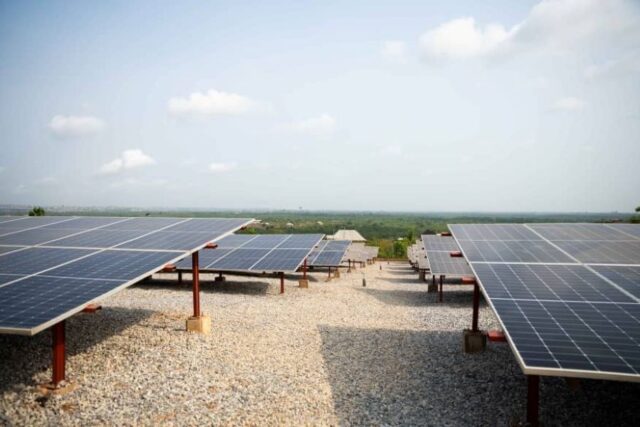...According to the CPPE, the policy proposition is a complete negation of the government policy to deepen and promote the adoption of renewable energy solutions by households
WED APRIL 02 2025-theGBJournal| ”A recourse to a hasty decision of banning importation of solar panels would be very disruptive and counter-productive. It is important to ensure adequate local capacity to fill the supply-demand gaps,” the Centre for the Promotion of Private Enterprise [CPPE] warns.
The warning comes after Minister of Science and Technology Mr. Uche Nnaji hinted about the plan of government to ban the importation of solar panels as a measure to promote domestic
production of the panels.
CPPE advised against the policy proposition given that Nigeria has one of the worst energy accesses with a per capita electricity consumption of about 160kWh, far below the sub-Sahara average of 350Kwh.
It said the adoption of solar energy solution is one of the most impactful government initiatives to tackle this problem and it has gained remarkable traction. A ban on the
importation of solar panels in the face of glaringly inadequate domestic production capacity would worsen the country’s energy crisis.
According to the CPPE, the policy proposition is a complete negation of the government policy to deepen and promote the adoption of renewable energy solutions by households, small businesses, rural communities and government institutions and other corporate organizations.
”This adoption of solar solution has gained an impressive momentum in the last two years, especially in the light of the soaring energy cost in the economy.”
CPPE adds also that it would worsen the problem of energy access as it would make the cost of solar energy solutions prohibitive, putting it beyond the average Nigerian.
The welfare cost of a ban on the importation of solar panels would be incredibly high as a result of the escalation in the cost of acquiring solar solutions. It is bad enough that the current cost of acquisition of solar energy solutions is quite exorbitant.
”What is desirable at this time is to seek ways to drive affordability, rather than escalate costs.”
The CPPE recommends that government should rather support investors in the solar panel production with robust fiscal and monetary incentives – tax incentives, tariff concession on intermediate products and concessionary long-term financing at a single-digit interest rate.
Meanwhile, the Centre urges the government to cut the import duty on batteries, inverters and wind turbines to 5%. This would significantly improve energy access, energy security and productivity in the economy.
”It would also reduce reliance on national grid for power supply. The current cost of batteries and inverters are very prohibitive,” the CPPE adds.
Some of the subsidies given in other climes to promote investment in renewable energy solutions includes investment tax credits, production tax credits, financial grants, power purchase agreements, concessionary financing and support from multilateral institutions.
The CPPE clarifies that Executive Order 5, which the minister alluded to, is a procurement policy which directs the MDAs to give preference to Nigerian service providers in their procurement process for goods and services.
”It is clearly different from a trade policy measure which has wider economic implications and requires a more rigorous study before policy pronouncements are made.”
X-@theGBJournal|Facebook-the Government and Business Journal|email:gbj@govbusinessjournal.com|govandbusinessj@gmail.com










